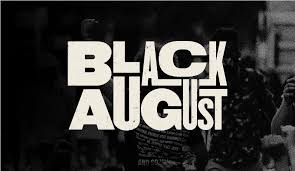
By: L. Imafidon
Every August, across the African diaspora, communities pause to observe “Black August”—a month dedicated to honoring freedom fighters, political prisoners, and grassroots activists who stood against oppression. Originating in the United States prison system in the late 1970s, Black August has since become a global tradition of remembrance, resistance, and reflection on the struggle for Black liberation.
Black August was first commemorated in 1979 by incarcerated activists in California, particularly those connected to the prison movement. It was inspired by the sacrifices of figures such as George Jackson, a member of the Black Panther Party who was killed in San Quentin prison in 1971, and his brother Jonathan Jackson, who was killed in a courtroom attempt to free political prisoners in 1970.
For these prisoners and activists, August was not just another month. Many critical moments in Black resistance history occurred in August:
-
The Nat Turner Rebellion (1831)
-
The start of the Haitian Revolution (1791)
-
The passing of Marcus Garvey (1940)
-
The March on Washington (1963)
-
The birth of leaders such as Marcus Garvey and Fred Hampton
Thus, August became a symbolic month of both mourning and inspiration, urging communities to honor those who paid the ultimate price for freedom.
Black August highlights figures whose sacrifices reshaped the struggle for liberation. These include:
-
George Jackson, whose writings (Soledad Brother and Blood in My Eye) inspired generations of activists.
-
Angela Davis, who championed prison abolition and Black liberation.
-
Assata Shakur, a revolutionary figure forced into exile.
-
African leaders like Kwame Nkrumah and Amílcar Cabral, whose struggles against colonialism resonate with Black August’s themes.
These names remind us that Black August is not about empty celebration but about studying history, reading radical works, organizing, and connecting present struggles to past lessons.
In Nigeria today, Black August resonates deeply, even though it was born in the diaspora. Issues of injustice, police brutality, corruption, and social inequality mirror the conditions that gave rise to Black August.
The #EndSARS protests of 2020—a youth-led movement against police brutality—echo the same resistance spirit celebrated in Black August. Activists like Aisha Yesufu, Rinu Oduala, and countless unnamed young Nigerians reflect the courage of those remembered in August. Many protesters were arrested, detained, or brutalized, just as freedom fighters of earlier generations were targeted.
Moreover, Nigeria’s prison system remains overcrowded, underfunded, and unjust, with many detainees awaiting trial for years—paralleling the very conditions that birthed Black August in American prisons.
Black August speaks to a universal truth: the struggle for liberation is not bound by geography. Whether in the United States, the Caribbean, Africa, or Nigeria, Black people have continuously resisted systemic oppression—be it slavery, colonialism, apartheid, racism, or authoritarian governance.
The commemoration urges reflection not only on history but also on the unfinished battles of today:
-
Mass incarceration and police brutality.
-
Political repression and corruption.
-
Economic inequality that keeps millions in poverty.
-
The silencing of voices calling for change.
By remembering the past, Black August creates a bridge to the present and a call to imagine a freer future.
Black August is more than a historical commemoration—it is a living tradition. It asks us to study, reflect, and act. For Nigeria, it provides a lens to connect struggles like #EndSARS, demands for good governance, and grassroots activism to a broader history of Black resistance.
As the African proverb says: “Until the lion learns to write, every story will glorify the hunter.” Black August is the lion’s story—a reminder that the fight for justice is not yet over and that each generation must pick up the torch of freedom.
Stone Reporters News
📩 Contact us: info@stonereportersnews.com
🌍 Website: stonereportersnews.com
🔗 Follow Stone Reporters for trusted updates on governance, legislative affairs, and national development.
📘 Facebook: Stone Reporters | 🐦 X (Twitter): @StoneReportNews


Add comment
Comments